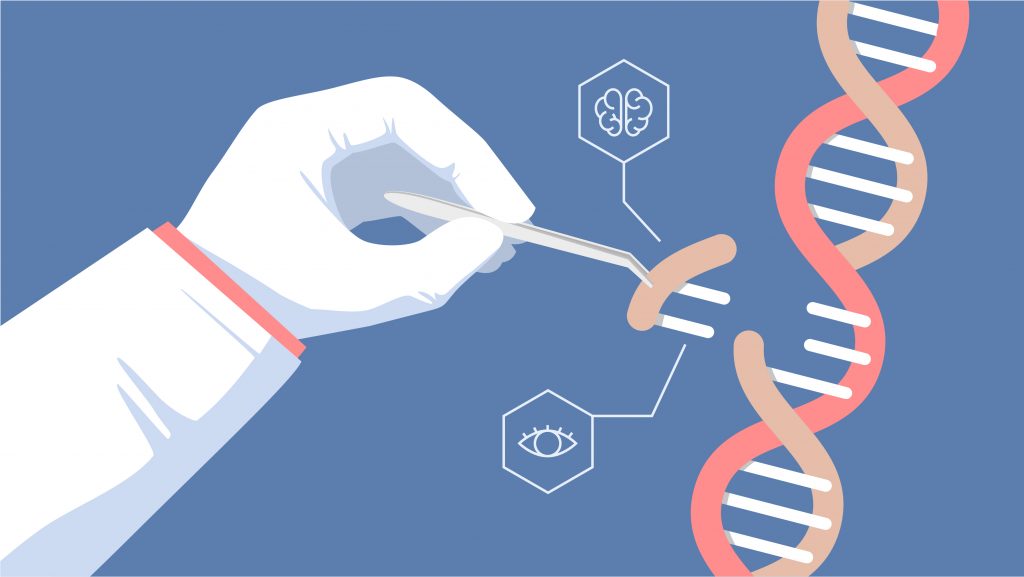Grocery shoppers will have noticed that for a food product to be considered truly “healthy,” it is no longer enough to be certified organic. Now, consumers worried about their health look for foods stamped with the label “non-GMO,” a designation that has become ubiquitous, even in the pet food aisle.
Supporters of genetic modification of food plants point to the great benefit of creating strains of wheat and rice that can be grown with less water, in a world where that commodity grows scarce and the population is booming. Those who oppose GMO crops call it a potentially dangerous and radical technology that breaks down nature’s genetic barriers with unforeseen consequences.
Recent developments in the field of genetic manipulation have raised the ethical stakes considerably, and have ushered the prospect of a not-so-distant future when not just food, but boys and girls may be certified as “non-GMO.”
In November 2018, a Chinese scientist, Dr. Jiangku He, announced the genetic modification and birth of two baby girls: Nana and Lulu. Using the same techniques developed to modify corn and wheat, he claims to have edited the girls’ genome and made them resistant to HIV infection.
If his experiment worked, he has “enhanced” their DNA, and in such a way that the results will be passed down to their offspring.
By experimenting on embryo humans in the laboratory and changing their genetic complements, and then transferring them to their mother’s uterus where they gestated and were born, he has crossed an ethical bright line.
He has also upset the scientific community, violated international agreements, and scared a public that is understandably wary of gene editing in plants, let alone humans.
Just as in plants, the main danger of genetic engineering for humans is unforeseen consequences, although these are much more ethically charged. With a food plant, we worry about negative consequences for people who eat them.
But when He changed the DNA of those two baby girls using a technique called CRISPR, he was conducting an “experiment” on them, and one, of course, they had not consented to. He hopes that he has “improved” their DNA, but the complex way genes are expressed are not fully understood.
Instead of conferring a new protection against HIV on these girls, he may have introduced, instead, a susceptibility to a virus or a predisposition to cancer.
Whatever he has done will be borne by them and by their descendants, bringing us to the next ethical assault: The human genome has been altered, and not by thousands of years of mating and natural selection, but by one rogue scientist on a quest for fame and the Nobel prize.
Only a little imagination is needed to envision the creation of a market around this new ability to “enhance” babies. Just as today labs offer us the ability to choose the sex of our child through sperm-spinning and sex-selective abortion, in the near-scientific future wealthy parents will choose their children’s qualities.
The offspring of the rich will be tall, athletic, smart, and resistant to cancer and infection. And everyone else will get by with whatever God gives them. Perfection will be offered for sale, but what people will be buying is the mad hubris of seeking to control and dominate everything, even the intricacies and surprises of human life.
Right now in the United States, experimenting on the DNA of human embryos is perfectly legal, while implanting them into a woman and letting them be born is prohibited by the FDA. This is not good enough.
The story of He has shown that every laboratory is the Wild West and every scientist a potential desperado. Our laws need to reflect the fact that the human genome is a universal patrimony and every human being, embryo or born, is a person deserving of the highest respect and consideration.
We’ve got high standards for food. We need to apply them to people.
Dr. Grazie Pozo Christie grew up in Guadalajara, Mexico, coming to the U.S. at the age of 11. She has written for USA TODAY, National Review, The Washington Post, and The New York Times, and has appeared on CNN, Telemundo, Fox News, and EWTN. She practices radiology in the Miami area, where she lives with her husband and five children.
SPECIAL OFFER! 44 issues of Angelus for just $9.95! Get the finest in Catholic journalism with first-rate analysis of the events and trends shaping the Church and the world, plus the practical advice from the world’s best spiritual writers on prayer and Catholic living, along with great features about Catholic life in Los Angeles. Subscribe now!

